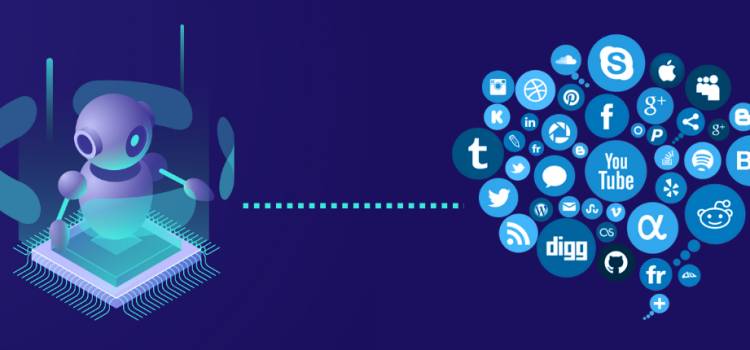
In today’s digital age, social media has evolved from a simple platform for sharing thoughts and photos to a complex ecosystem that connects billions of people worldwide. As the volume of content and user interactions continues to grow exponentially, the role of Artificial Intelligence (AI) in personalizing social media experiences has become increasingly significant. This article explores how AI is revolutionizing the way we interact with social media, enhancing user engagement, and shaping the future of digital communication.
The Evolution of Social Media
Social media platforms like Facebook, Twitter, Instagram, and LinkedIn have become integral parts of our daily lives. These platforms initially served as venues for social interaction, but they have now transformed into powerful tools for marketing, entertainment, and news dissemination. With millions of users generating vast amounts of content every second, the challenge for these platforms is to deliver relevant and engaging content to each user.
The Need for Personalization
In a sea of endless posts, videos, and articles, users can quickly become overwhelmed. The need for personalization is paramount to keep users engaged and satisfied. Personalized social media experiences ensure that users see content that is most relevant to their interests, behaviors, and preferences. This not only enhances user satisfaction but also increases the time spent on the platform, driving higher engagement rates and, consequently, more advertising revenue.
How AI Powers Personalized Social Media
1. Content Recommendation
One of the most visible applications of AI in personalized social media is content recommendation. Algorithms analyze user behavior, such as likes, shares, comments, and viewing history, to predict what content a user is likely to engage with. Machine learning models continuously learn from user interactions to refine these predictions.
For instance, YouTube’s recommendation engine suggests videos based on a user’s watch history and engagement patterns. Similarly, Instagram’s Explore page curates posts and stories tailored to individual user preferences. These AI-driven recommendations ensure that users are constantly presented with content that resonates with their interests.
2. Targeted Advertising
AI plays a crucial role in delivering targeted advertisements on social media platforms. By analyzing user data, including demographics, interests, and online behavior, AI algorithms can identify the most relevant ads for each user. This not only improves the effectiveness of advertising campaigns but also enhances the user experience by showing ads that are more likely to be of interest.
Facebook’s ad targeting capabilities, for example, leverage AI to segment users into highly specific audience groups. Advertisers can then create personalized ad campaigns that reach the right audience at the right time, maximizing their return on investment.
3. Sentiment Analysis
Understanding user sentiment is essential for personalizing social media experiences. AI-powered sentiment analysis tools can analyze text, images, and videos to determine the emotional tone of user-generated content. This information can be used to tailor content recommendations and advertisements to match the user’s mood and preferences.
For example, Twitter uses sentiment analysis to identify trending topics and gauge public opinion on various issues. Brands can leverage this information to create content that aligns with current sentiments, increasing the likelihood of engagement.
4. Chatbots and Virtual Assistants
AI-driven chatbots and virtual assistants are becoming increasingly common on social media platforms. These intelligent agents can engage with users in real-time, providing personalized responses and recommendations. Chatbots can handle customer inquiries, offer product suggestions, and even facilitate transactions, creating a seamless and personalized user experience.
Facebook Messenger, for instance, allows businesses to deploy AI-powered chatbots to interact with customers. These chatbots can answer frequently asked questions, provide personalized product recommendations, and assist with order tracking, enhancing the overall user experience.
5. Content Moderation
Maintaining a safe and respectful online environment is crucial for social media platforms. AI-powered content moderation tools can automatically detect and remove inappropriate or harmful content, ensuring that users have a positive experience. These tools use machine learning algorithms to analyze text, images, and videos for violations of community guidelines.
Platforms like Instagram and TikTok employ AI to identify and remove content that violates their policies, such as hate speech, nudity, and graphic violence. By swiftly addressing harmful content, AI helps create a safer and more enjoyable social media experience for all users.

Challenges and Ethical Considerations
While AI has undoubtedly transformed personalized social media experiences, it also raises several challenges and ethical considerations.
1. Privacy Concerns
The use of AI in personalized social media relies heavily on user data. Collecting and analyzing this data can raise privacy concerns, as users may feel uncomfortable with the extent to which their online behavior is monitored. Social media platforms must be transparent about their data collection practices and ensure that user data is handled securely and ethically.
2. Algorithmic Bias
AI algorithms are only as good as the data they are trained on. If the training data is biased, the algorithms may produce biased results. This can lead to unfair treatment of certain user groups and reinforce existing inequalities. Social media platforms must actively work to identify and mitigate algorithmic bias to ensure fair and equitable experiences for all users.
3. Filter Bubbles
Personalized content recommendations can create filter bubbles, where users are only exposed to information that aligns with their existing beliefs and preferences. This can limit exposure to diverse perspectives and contribute to the spread of misinformation. Social media platforms must strike a balance between personalization and promoting a diverse range of content to foster informed and well-rounded user experiences.
The Future of AI in Personalized Social Media
As AI technology continues to advance, the potential for personalized social media experiences will only grow. Here are a few trends to watch for in the future:
1. Enhanced User Profiling
AI will become even more adept at understanding user preferences and behaviors. Advanced profiling techniques will enable platforms to deliver hyper-personalized content and advertisements, further enhancing user engagement.
2. Real-Time Personalization
Real-time personalization will become more prevalent, with AI algorithms dynamically adjusting content recommendations based on a user’s current context and activities. This will create highly responsive and immersive social media experiences.
3. Ethical AI Practices
Social media platforms will increasingly prioritize ethical AI practices, ensuring transparency, fairness, and accountability in their algorithms. This will help build user trust and address concerns related to privacy and bias.
4. Integration with Augmented Reality (AR) and Virtual Reality (VR)
AI-powered personalization will extend to AR and VR experiences, creating immersive and tailored social media interactions. Users will be able to engage with content and advertisements in entirely new ways, further blurring the lines between the digital and physical worlds.
Conclusion
AI has fundamentally transformed the way we experience social media, enabling highly personalized and engaging interactions. From content recommendations and targeted advertising to sentiment analysis and chatbots, AI is at the forefront of enhancing user experiences on social media platforms. However, it is essential to address the challenges and ethical considerations associated with AI to ensure that these advancements benefit all users.
As we look to the future, the role of AI in personalizing social media experiences will continue to evolve, offering exciting possibilities for users and businesses alike. By embracing ethical AI practices and leveraging advanced technologies, social media platforms can create more meaningful and enjoyable experiences for their global user base.












